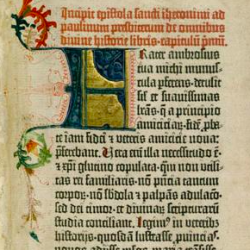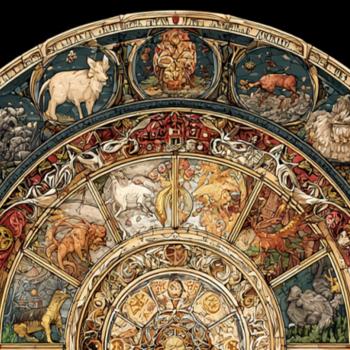The man wore a baseball cap, glasses, and Khaki shorts. He might have been forty or fifty years old. He had a baby face. I only saw him up close for a few seconds. He presented no workshops, he worked no stalls, and he played no music. Still, he remains in my memory more than anyone else at the St. Louis Pagan Picnic this year. He haunts my recollection of the weekend not because of what he looked like, but because of what he carried: a ten-foot-tall cross, which he dragged along the row of merchants at the center of the Pagan picnic.
He walked back and forth, up and down that boulevard. We couldn't help but notice, pointing him out to each other every time his burden crested above the heads of the crowd. Mostly we mocked him. We pointed out the potential for stooge-esque slapstick should he make a sharp turn and crack someone with the butt of his cross. One person spent a good hour walking about a hundred paces ahead of him while singing, "Praise White Jay-Sus!" in an exaggerated drawl.
I suppose that he was there to be mocked; it was what he desired and deserved. The St. Louis Pagan Picnic is unlike most Pagan festivals. It's more akin to a GLBQT Pride event than a retreat like the Pagan Spirit Gathering. As much as it is about connecting members of our city's Pagan community to one another, it is equally about a public statement of our existence—a public event in a public park that has been announcing for twenty years the legitimacy of Paganism. The man with the cross clearly stood in opposition to that statement. By his very presence, he announced his dismissal of our beliefs and values—a reminder of our status within the dominant culture of monotheistic religion. A cross literally loomed above our heads.
We pointed him out to my dad after he and my mom arrived at the picnic. He laughed too, at first. There was a group of Amtgard people at the picnic doing boffer weapon fighting, and we wondered aloud whether the cross would give him enough reach to take out a few of them before he was overrun. But then my dad, the contrarian that he is, changed his tone a bit. "I've got to say," he said, "that he doesn't offend me as much as some of the people here who are just to make a buck off of Paganism."
There was certainly truth to his statement. With the exception of a few basic ritual supplies and statuary, just about everything to be found in the Pagan marketplace --including most of the customers—left me a bit skeptical. I can't look into anybody's heart, of course, but I'm sure the man with the cross was more sincere in his convictions than many of us were. He was doing something I found wrong-headed and stupid, but he was surrounded by hundreds of people that he probably found just as wrong-headed and just as stupid.
The man with the cross only spoke to me once. As I shuffled down the row, considering whether to indulge in some Sweet Meat Stix (as best as I can tell, the most ardent supporter of Paganism in the meat-vending community), he came up to me and looked at my shirt.
"What's that say?" he asked.
"It's the first page of Beowulf," I said.
"What's that?," he asked
"It's an Old English poem," I replied.
"Oh," he said.
Then he paused and we looked at each other expectantly, each knowing the next words that would come out of the other's mouth.
"Do you ever read the Bible?" he asked.
"Sure," I said, "Plenty of times."
To my surprise, that seemed to be good enough for him.
"Alright, then," he said as he lifted his cross and kept walking.
I watched him drag his planks of wood away, wondering about what kind of life he led. I have seen many an angry street preacher, the confrontational sort that aspires to use shame to bring others to salvation. This man did not seem like one of those. He seemed more inclined to use equal parts of guilt and good nature. I didn't think he was a bad man, but I doubted we could have ever really talked about anything. We might have exchange words, but not understanding? In the end, our positions were too fixed. At the end of the day, he would still think of me as a sinner, and I would still likely think of him as a fool.
I was still thinking about the encounter while driving home from the Pagan picnic that night. I passed under the trees and across the grass of Tower Grove Park, a place not far from my parents' house. I spent many hours of my childhood there. As I passed beneath those familiar trees, I thought about what he had said.
"Do you ever read the Bible?" he asked, thinking that anyone who had would find the truth of Christianity self-evident. I thought to myself: do you ever look at the trees?
12/2/2022 9:01:59 PM





